

30,000 CFOT®s and Counting! OFSTP-14 is DEAD! Long Live OFSTP-14! FOA Web Page on Job Opportunities Fiber Optics Update: What is a "Fiber Optic Network" ? ACP - Asia Communications and Photonics Conference - Shanghai Webinars of Interest NEW: FOA Jobs Web Site FOA Online Fiber Optic Reference Guide New Schools Tech Topics Q&A: Questions we've answered recently. Product News Worth Reading: Interesting things we've read.
|
It's now CFOT® The FOA CFOT® (Certified Fiber Optic Technician) is now a registered trademark. With over 25,000 fiber optic techs holding CFOTs and the CFOT being recognized worldwide as the foremost certification in fiber optics, the FOA realized the value of the CFOT required trademark protection. Now it's official! Want to know more about fiber optics? Looking for specific information? Study for FOA certifications? Here's the largest technical reference on the web: The FOA Online Fiber Optic Reference Guide. Free Self-Study Program on "Fiber U" FOA Home Page Contact the FOA |
| Renew your FOA certification online - plus get a discount coupon for the new FOA books and get an extra month free. Details here. |
FOA Publishes New Textbook On Outside Plant Fiber Optics FOA Reference Guide to Outside Plant Fiber Optics 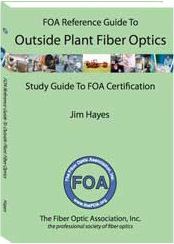 The FOA has published a new textbook on outside plant fiber optics, the FOA Reference Guide to Fiber Optics. This textbook is designed to be used for training outside plant fiber optic technicians, studying for FOA certification and as a reference guide for anyone interested in outside plant fiber optics. The book is available from the FOA eStore or Amazon.com for only $27.95 and will soon be available on the Apple iPad and Amazon Kindle electronic book reader. Outside plant (OSP) fiber optics covers a giant topic, including applications like telephone and wireless backhaul, CATV, municipal networks, utility “smart grid” and the like. The book covers all types of OSP installations including underground, buried, aerial and submarine along with the specialized components, installation techniques and testing requirements for these applications. This new FOA textbook is the third in a series of reference guides from the FOA covering basic fiber optics, premises cabling (fiber, copper and wireless) and now outside plant fiber optic cabling. This textbook was developed from new material on the FOA Online Reference Guide website (www.foaguide.org), the largest and most widely used reference site about fiber optics on the Internet. For those who prefer reading printed material, we offer this new book, a basic reference for fiber optics and a study guide for FOA certifications. Supplementary materials with even more depth on many subjects, are, of course, on the FOA Reference Guide website. The FOA has always tried to provide the world with sources of technically correct, unbiased information on fiber optics using both print and electronic media. With the FOA’s experience in certifying over 30,000 fiber optic techs in the last 15 years, we have included the most up-to-date information and organized the materials to make them better arranged for training. The FOA Reference Guide to Outside Plant Fiber Optics will be used as the new reference guide for training students for the FOA Certified Outside Plant Fiber Optic Technician (CFospT) certification. The FOA Reference Guide to Fiber Optics, ISBN: 1450559670, is available at the FOA eStore (https://www.createspace.com/3429177) or Amazon.com for $27.95. 30,000 CFOT®s and Counting! During June, 2010, the FOA certified its 30,000th CFOT®. Since its beginning in 1995, the FOA has grown rapidly, and with the accelerating pace of fiber optic applications - driven by other technologies like wireless, security, passive optical LANs, and data centers - has created more demand for well-trained and certified fiber optic technicians. The FOA is now growing at a rate of about 15% per year, astounding in the current world economic turmoil, but indicative of the importance of fiber optics to communications in todays world. FOA salutes all 30,000 of our CFOTs and holders of other FOA certifications and the hundreds of FOA-Approved schools that have trained the majority of them. OFSTP-14 is DEAD! Long Live OFSTP-14! OFSTP-14 is, of course, the TIA standard for testing installed multimode fiber optic cable plants which has been around more than 20 years and is the one TIA standard probably most familiar to contractors and installers. It has been due for updating, but TIA has been replacing many US-written standards with the equivalent international documents. The TIA has adopted IEC 61280-4-1 as the replacement of OFSTP-14. Most of the two documents is the same, with some important exceptions.
$800 million More For Broadband Stimulus Programs in US U.S. President Barack Obama announced on Friday nearly $800 million in loans and grants for the build-out of broadband networks to reach homes, schools and hospitals. The grants and loans, which will be matched by another $200 million in private investment, is part of Obama's roughly $800 billion federal stimulus package, which includes $7.2 billion for broadband expansion projects. The 66 new infrastructure projects will directly create 5,000 jobs and help spur economic development in some of the nation's hardest-hit communities. The departments of Agriculture and Commerce are administering a total of $7.2 billion in grants and loans for projects in 50 states and Washington, D.C. Read more - Reuters.  Fiber Optics In State-of-the-Art Science/Art Center Installation Fiber Optics In State-of-the-Art Science/Art Center InstallationThe Leonardo, Utah’s science-tech-art center, has selected an artistic collaborative to create a major public art installation in the building, which will open to the public April, 2011. Brian Brush and Yong Ju Lee, both of New York City, will create an installation, called the “Dynamic Performance of Nature,” that will be both an artistic and architectural feature on The Leonardo’s main floor. The FOA was pleased to provide some technical assistance and sample fibers in the design of the project. The installation will be constructed of custom-milled, recycled-plastic panels arranged in a wave pattern, such as that of light or sound. Fiberoptic cables hang between the panels and are attached to solar-powered LED lighting array, which changes color, intensity, and flashing duration based on a connection to environmental sensors that measure data from activities like wind, seismic or solar activity, precipitation, and visitor movements. Click on the image to read more and see the video or go here. And if you really want to see wild fiber art, take a look at this fiber optic bed cover and pillow! What is a "Fiber Optic Network"? And who has the right to decide that? We reported in the last FOA Newsletter that the National Advertising Division (NAD) of the Better Business Bureau (BBB) has told Time Warner Cable and Cox Communications that they should not use the term "Fiber Optic Network" in their advertising, responding to a complaint about their advertising from Verizon. You can read the complete NAD comments on Time Warner Cable and Cox Communications at these links. The Fiber Optic Association, Inc. send a response to NAD saying we think the NAD decision is misguided. Time Warner is appealing NADs decision, so there is still time to comment. The FOA sent a letter to NAD expressing our opinions. If you want to comment also, here is the NAD website: http://www.nadreview.org/ContactUs.aspx Address your comments to C. Lee Peeler, President. ACP - Asia Communications and Photonics Conference - Shanghai, December 2010 Asia Communications and Photonics Conference and Exhibition (ACP) is Asia's premier conference and exhibition in the Pacific Rim for photonics technologies, including optical communications, biophotonics, displays, illumination and applications in energy. The event will take place 8-12 December 2010 in Shanghai, China at the Shanghai International Conference Center & Oriental Riverside Hotel. The five technical societies IEEE Photonics Society, OSA, SPIE, the Chinese Optical Society and the Chinese Institute of Communications-have joined together to co-sponsor the ACP 2010 conference. The Local Organizing Committee with participation from Shanghai Jiaotong University, Fudan University, Institute of Optics and Fine Mechanics will be responsible for local organization of the technical conference. More. Lightwave Organizing Optical Networks for Enterprises (ONE) Conference Lightwave is organizing a conference dealing with optical networks in the enterprise. Here's their description: "Lightwave's Optical Networks for Enterprises (ONE) Conference is unlike any other communications, networking or optical conference. Enterprise, government and service provider organizations are looking for practical solutions to rapidly expanding bandwidth and network cost challenges, and Lightwave’s ONE Conference focuses specifically on their needs. With a 25-year track record of excellence in explaining the technologies, strategies and product options for building, maintaining and upgrading optical networks, Lightwave is uniquely positioned to bring together the thought leaders who can provide the practical advice managers need to make the right optical networking decisions." Date: October 4-6, 2010 Location: Los Angeles Convention Center, Los Angeles, CA Collocated with ITExpo More Information Webinars of Interest Broadcast Engineering Magazine - Fiber Optic Testing FOA President Jim Hayes presents an overview of fiber optic testing for all applications. Available on Demand. Sign up here. Multimode Fiber Trends from TIA's Fiber Optics LAN Section Ryan Chappell, Draka Communications, looks at the evolution of multimode fiber, examines its current usage and shares predictionson its future Available on-demand at: http://www.brighttalk.com/webcast/7182/play OSP Magazine Webinars OSP Magazine (OSP as in outside plant telco) is now offering a number of interesting webinars that cover fiber topics, including network design and specialized components. http://www.ospmag.com/events/web/ What Should A Fiber Optics or Cabling Tech Know and What Skills Do They Need? The FOA has been updating its lists of KSAs (Knowledge, Skills, Abilities) for fiber and cabling techs. The updated list is now on the website for your information and comments - as fiber and cabling KSAs evolve as new technologies develop. KSAs for fiber and cabling techs. It's Now A Lot Easier To Find A FOA-Approved Training Organization 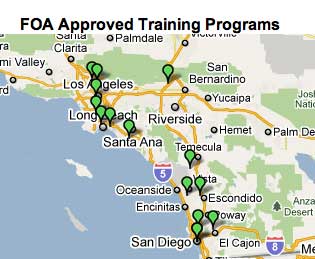 Most phone calls we get regarding finding a FOA-Approved training organization want to know two things: what school is closest to me or what school offers the certifications I need. That can be difficult, since the FOA has almost 200 training organizations we have approved worldwide! We've been looking at ways to make it easier, and we think we've got a good solution. In fact we have two solutions. First we have added a sortable table of all the FOA-Approved schools. You can also use our FOA Google Map Application to find FOA-Approved schools. Here are links to the sortable table of all the FOA-Approved schools and FOA Google Map.
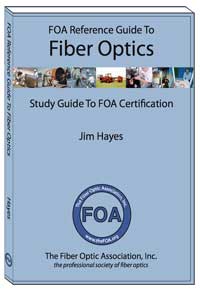 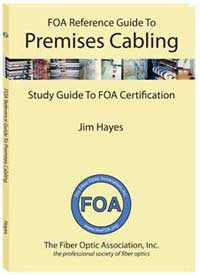 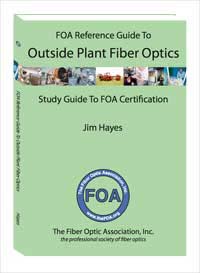 We have created three new FOA books to be used in training for FOA certifications and as reference books for contractors, installers and end users of fiber optics. These books have full curriculum support, including free curriculum materials for teaching FOA certification courses. Because we are self-publishing these books using more modern "publish on demand" technology, they are easier to keep up to date, easier to buy and much, MUCH cheaper! Details on the new book each of the new books are at the book pages linked to the photos above. FOA Online Fiber Optic Reference Guide New: Polarity The FOA Online Fiber Optic Reference Guide has become very popular - perhaps the most popular technical website ever, typically with over 30,000 users monthly! We continue updating materials regularly, keeping it as up to date as possible. Just this month, we added a page on "polarity" for fiber optic networks. Although it seems obvious that connecting transmitters to receivers is required, how it's accomplished can be confusing! We already updated the Premises Cabling sections in conjunction with publishing the FOA Premises Textbook and are now focused on outside plant applications (OSP.) We've already added a new page on chromatic dispersion (CD) and polarization-mode dispersion (PMD). Next we're working on cables for OSP applications and splicing. Find What You Want Using "Google Custom Search  There's so much information on the FOA Tech Topics and Online Fiber Optic Reference Guide
that even a well-organized Table of Contents isn't enough and when the
material is always changing, an index is impossible to maintain. So the
FOA is using the latest technology in search, Google Custom Search,
which will allow you to search just the FOA Tech Topics and Online Fiber Optic Reference Guide for any topic you want to find more about. Try it! There's so much information on the FOA Tech Topics and Online Fiber Optic Reference Guide
that even a well-organized Table of Contents isn't enough and when the
material is always changing, an index is impossible to maintain. So the
FOA is using the latest technology in search, Google Custom Search,
which will allow you to search just the FOA Tech Topics and Online Fiber Optic Reference Guide for any topic you want to find more about. Try it! Go to The FOA Online Fiber Optic Reference Guide. Featured School: Mississaug Training Consultants Mississauga, Ontario, Canada At 1:30pm, June 23rd, things were looking up. The 12 person Installation and splicing class was on the 6th floor of the Monte Carlo Hotel in Mississauga, Canada. They were in the midst of doing the five day CFOT® course to become certified installers through the Fiber Optic Association. As I watched the students polish their connectors I noticed the tables starting to sway. Sure enough as we, and the building, swayed with a 5.5 earthquake the students polished on completing their connectors and with extremely low loss. Taking the fiber optic Installers certification course in itself was a positive achivement but fearlessly polishing the connectors during an earthquake....hey that was something else. Further, these students complete the FOA Training program with a high degree of proficiency in splicing and polishing connectors, including APC, SM connectors with a reflection of -70 db and at least equal to or better than the best factory products. Our class learns by doing that pigtails are not needed and they quickly find that the can add furcation tubing to the fiber and install a connector at least to industry standards and save the cost of a splice tray, fiber manager and the additional splice loss. Bill Graham Welcome New FOA-Approved Schools: Ouachita Technical College, Malvern AR (#313) Puget Sound Energy, Redmond, WA (#312) Find a listing of all the FOA-Approved schools here. Good Question! Tech Questions Worth Repeating Fiber Optic Polarity Q: This summer a fiber ring is being installed on our campus. It will be terminated in a 24 port fiber patch panel in each buiding. Does the industry standard provide that if I attach fibers 1 & 2 to my servers and fibers 1 & 2 to the network in each other building that they will be able to communicate? Or is it far more complicated than that? A: Since most fiber optic links use two fibers transmitting in opposite directions to create a full duplex link, you need to ensure that transmitters are connected to receivers and vice versa. Traditionally, fiber links are made where pairs of fibers are crossed between patch panels so fiber 1 at one patch panel will be connected to fiber 2 at the patch panel on the other end, fibers 3/4. 5/6. etc. are handled likewise. Thus, when connecting patchcords, fiber 1 (or the odd numbered fibers) can always go to the transmitter and fiber 2 (or even numbered fibers) goes to a receiver and proper connectivity is maintained. This is described in TIA-568 as polarity. Obviously, nothing substitutes from proper markings and documentation of the cable plant, a task that is often given little consideration until the network equipment installers are forced to use a visual fiber tracer to find which fibers to connect. If possible, discuss this with the fiber installers to ensure you are on the same wavelength (pun intneded.) BTW, the FOA has a good Tech Bulletin and web page for network users: Choosing, installing and using fiber optic products for communications network users and User's Guide To Fiber Optics Just this month, we added a page on "polarity" for fiber optic networks to the FOA Online Reference Guide. Nothing is more confusing that jargon. Here is a Q&A on jargon: Q: One thing I did notice, you teach that there are three types of UTP cable tests, wire map, certified and verified here; http://www.thefoa.org/tech/ref/premises/test.html. There is the danger that trained individuals will confuse cable testers called" verifiers" and "certifiers" for cable that is printed "verified". UL's definition of verified is individual critical attributes testing and NOT BERT testing, which is just the opposite of a "verification" BERT tester. The "certifying" tester is more apt to "verify" a cable, permanent link, or channel. I know this seem minor but it isn't. There has to be a clear distinction as to what the customer wants, BERT verses attribute tests. And the use of conflicting terms between cable and hand-held testers is unfortunate. A: You're right about UL. Not only do they use "verified," but they use "certified" as well - I remember when it was just "listed." (http://www.ul.com/global/eng/pages/offerings/industries/wireandcable/faq/) I believe that Ron Vogel of Test-Um was the initiator of the "verification" term when he dropped a GBE chip into a tester and started selling it at a fraction of the cost of a UTP cable "certifier," although I've actually never seen the term "verified" used for cable tested with one of his testers. Fluke, of course sells a cable "verifier" too (http://www.flukenetworks.com/fnet/en-us/products/MicroScanner%202/Overview) so that means it's made it to the industry jargon. A quick search shows 3030 references to the term "verification" and 2850 for "verified" on the UL website! UL is even ambiguous about their use of the term; see what they say: "What does the term "verified" mean? The term "verified," when used in a UL marking, means that the product has been tested and complies with one or more specific requirement. These requirements may be safety- or performance-related. In the UL system, the words "Classified" and "verified" mean the same thing. For a complete explanation of "Listed," "Classified" and "Recognized," read more on the UL Mark." Reminds me of a panel at ComNet with Bob Metcalfe, co-inventor of Ethernet, who said "Standards are such wonderful things because we have so many to choose from." Q: I bid a job today with 50 um aqua OM3 MM. Any special characteristics as far as fusion splicing and testing? I know I will have to get some LC jumpers of 50 um size. A: No problems should be expected. If you're splicing it, check the fusion splicer programs (and maybe the fiber manufacturer) to see if special setup parameters are needed. And you will probably need hybrid jumpers with LCs to the connectors on your test equipment. Q: We're having a fiber network installed. We know that two fibers are used for each link, but how do you ensure transmitters are always connected to receivers? Where do you make the crossover in the fibers? A: While there are several ways to do this, it's less complicated to do it in the fixed cabling, not the patchcords. Here is an explanation of fiber optic link polarity on the FOA Online Reference website. Connector or "Connection" Loss? Q: Isn’t the loss in the standard for a connector pair and not a single connector? A: Yes, it is. All connector losses are for a mated pair. We've been trying for years to say "connection loss" instead of "connector loss" but most everybody still says "connector loss" and we fall back into that often ourselves. Here's what is in the FOA online reference guide at http://www.thefoa.org/tech/ref/basic/term.html : "Connector and Splice Loss The primary specification for connectors or splices is loss or the amount of light lost in the connection. When we say connector loss, we really mean "connection" loss - the loss of a mated pair of connectors, expressed in "dB." Thus, testing connectors requires mating them to reference connectors which must be high quality connectors themselves to not adversely affect the measured loss when mated to an unknown connector. This is an important point often not fully explained. In order to measure the loss of the connectors you must mate them to a similar, known good, connector. When a connector being tested is mated to several different connectors, it may have different losses, because those losses are dependent on the reference connector it is mated to." We were discussing this recently with another person who has a spec which calls for a loss for the mating adapter! We had to help him explain to the spec writer that each connector and the mating adapter contribute to the loss but one cannot apportion the loss to each component separately! Low Water Peak Fibers Q: One of the issues on which vendors try to differentiate themselves is "zero" and "reduced" water peak fiber. Is there anything in Fiber U or the FOA that addresses this? A: Low water peak fiber is done to allow coarse WDM. It's very expensive to do and not very worthwhile unless you want to do CWDM. See http://www.thefoa.org/tech/ref/testing/test/CD_PMD.html for details. OTDR Gainers Q: Why do we see a “gain” in some OTDR measurements? How can there be a gain? A: Gainers are caused by differences in the backscatter coefficient of the fibers being spliced. Not only does that cause gainers, but in the opposite direction it causes the loss to be shown as greater than it actually is and it affects the measurement accuracy of any loss measurement with an OTDR. We have a tutorial on OTDRs that covers what we call "gainers" on the FOA Online Reference Guide: http://www.thefoa.org/tech/ref/testing/OTDR/OTDR.html Fiber Cleaning This is a topic we keep reminding everybody about, and here is why: From a contrator in the Middle East: Here some samples of the connectors for SM fiber already installed in the system we were testing. 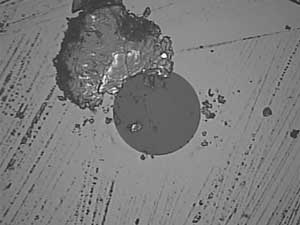 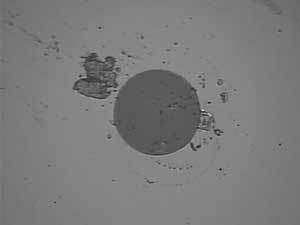 As you can see, the dirt is large compared to the size of the fiber (dark gray), and the core (not visible here) is only 9/125 of the overall diameter of the fiber! See Product News below for links to vendors of fiber cleaning products. Measurement Uncertainty: Everyone testing fiber optics should understand that every measurement has some uncertainty - whether you are measuring loss, length, wavelength, power, etc. Knowing that uncertainty is very important to interpreting the measurement. It's worthwhile to read and understand the issue of measurement accuracy covered in this page of the FOA Online Fiber Optic Reference Guide. Worth Reading: Fiber Optic Safety Poster We've had numerous requests to reprint our guidelines on safety when working with fiber optics, so we have created a "Safety Poster" for you to print and post in your classroom, worksite, etc. We suggest giving a copy to every student and installer. Multimode Fiber Characterization Launch Condition Considerations - new ap note from JDSU 10 Fiber optic undersea cables planned for Africa. One new cable just opened. Nanoscale Structures may lead to faster fiber optic communications. Laser emits "dark pulses" instead of light. An experimental type of laser could lead to faster communications. Alcatel-Lucent wins FTTx role in Australia’s broadband expansion. High Speed Access Report from IGI The High Speed Access Report (HSAR) is a quarterly newsletter covering the current state of high-speed access, including xDSL, cable modems, and FTTx. The data are derived from quarterly reports of the telcos and MSOs and delivered to subscribers in a timely manner. Each issue includes a wealth of information in the form of tables and graphs. You can download the 4Q2009 report talking about Google and connections to the home for free.  FREE Web conference hosted by the TIA's Fiber Optics LAN Section FREE Web conference hosted by the TIA's Fiber Optics LAN SectionMultimode Fiber Trends Presented by Ryan Chappell, Draka Communications In this presentation, Chappell will look at the evolution of multimode fiber, examine its current usage and share predictions based on research by CRU, IEEE, Penwell, Cisco, IBM, Mathew Burroughs, and Alan Flatman. The Webconference is available on-demand at: http://www.brighttalk.com/webcast/7182/play To download a PDF copy of the presentation please visit our Website, www.fols.org. New Report : FTTH connections continue to grow in North America You can download and read the entire report from the FTTH council website. http://www.ftthcouncil.org/sites/default/files/RVA.FTTH_.Apr10.040712Final.pdf Testing FTTH JDSU shows how to test a PON with an OTDR: http://www.jdsu.com/other-literature/PON-OTDR_fop_an_ae.pdf The lost souls of telecommunications history If you like techie history, you will enjoy this one. Arstechnica JDSU Reference Guide to Fiber Optic Testing – Volume 2 Published  The second volume of the JDSU series on fiber optic testing has been published. Volume 1 focused on Basic Fiber testing and Volume 2 is geared toward fiber optic installers, project managers, telecom technicians and engineers who need to understand fiber networks. Volume 2 also covers Chromatic Dispersion, Polarization Mode Dispersion, Attenuation Profile and Fiber Link and Network Characterization. A 3rd volume, a glossary of fiber optic terms, is also available for download. This is a "MUST HAVE" for all fiber optic techs. Download your free copies here. We used this book as one of our references in creating a new page in the FOA Online Reference Guide on chromatic dispersion (CD) and polarization-mode dispersion (PMD). Careers in Fiber Optics: Brian Smith. A 1998 book on fiber optic jobs is a bit dated, but a free overview is on Google Books and worth a look at it online. Dirt! As much as 70% of the problems associated with deploying fiber to the home result from something as simple as dirty connectors according to JDSU. Telephony Online. Good Technical Websites American Polywater (http://www.polywater.com/) has one of the best technical website for cable installers. Here is a rundown on some new material on their site. Cable Installation using "Push" or "Push/Pull" Polywater's new Pull-Planner™ 3000 Software allows a "pushing force" variable in pulling tension calculations. Read a White Paper that quantifies the push contribution and compares calculation results to field experience. -- http://www.polywater.com/pushing.pdf Pulling Cable Through Water? Read a Product Spotlight on Polywater® + Silicone™, Polywater's new generation underground lubricant. Continued reduction of friction when pulling through water is only one of the unique features of this lubricant. -- http://www.polywater.com/NNNBSL.pdf Check out their website, especially “Videos,” “Engineer’s Corner” and “Calculators.” http://www.polywater.com/NNNBSL.pdf  " Heard on the Street" is a monthly online newsletter from Frank Bisbee of Communications Planning Corporation that covers the telecommunications and cabling businesses. Each month includes news from manufacturers, trade associations and professional societies like the FOA. You can read the current issue and back issues online.  JDSU has announced the See the Light webinar series, a four-part program designed for anyone involved in the installation, maintenance, and repair of fiber optic systems. It begins with fiber inspection and cleaning and then covers the basics of fiber testing. The webinar series then continues with the more advanced optical time-domain reflectometer (OTDR) and fiber local area network (LAN) testing challenges. More information on the series. IGI is offering a series of webinars on topics of interest to those in the communications industry. You can join them live ir download from the archives. IGI WEBINAR ARCHIVES UP AND RUNNING - VISIT TELECOMBRIEFINGS.COM TO DOWNLOAD! IGI, a major market research and technology reporting company (the "Active Optical Cables" below) is offering a a free one year subscription to one of our fiber optics newsletters to FOA members. All they have to do is to send IGI an e-mail stating which newsletter they would like to get. See http://www.igigroup.com/nl.html for a listing of IGI Newsletters. The new FOA reference website is now online. New sections have been added on fusion splicing and mechanical splicing. Check out the current Table of Contents. This month, we added a page on "polarity" for fiber optic networks. Coming soon to a network near you - 40 and 100 gigabit/sec Ethernet! The IEEE is already working on specs for 40 and 100 gigabit/sec Ethernet and have approved a number of new PMDs (that's standards-speak for Physical Medium Dependent - i.e. cabling). A summary of the proposals is on the updated list of network specs at http://www.thefoa.org/tech/Linkspec.htm.
New Resin For Molded Fiber Optic Connectors SABIC Innovative Plastics has developed new grades of its Ultem polyetherimide (PEI) resin, as well as Ultem-based compounds, to suit medical and electrical/electronic components applications. SABIC has developed specialized grades of Ultem to enable development of one-piece molded connector designs. The company says these grades can be finely geared to specific wavelengths, offering attenuation control, very high heat resistance, and dimensional stability for accurate fiber alignment. The new materials are intended to reduce connector costs by up to 20%, while speeding up fiber installation and providing long service life, according to the company. More. 3M™ Fiber Dome Closure FDC 08S 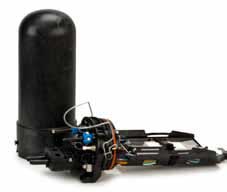 The new, compact 3M™ Fiber Dome Closure FDC 08S is a hermetically sealed fiber dome closure for aerial, buried above-grade, and buried below-grade applications. This closure is designed to meet the needs of anyone using fiber optic splice closures in the long haul, metro, local access (DSL, HFC, mobile wireless back haul) and FTTP feeder and distribution networks. It is designed for butt, single or ribbon fiber cable applications. Yes, An OTDR-Type Instrument Can Resolve Short Lengths - with mm Resolution Luna Technologies offers a OFDR - optical frequency domain reflectometer that can resolve about 3 mm (1/8 inch) out to 500 meters. OFDRs work in the frequency domain, not timing a return signal, to get ultra high resolution over a limited distance range with considerably less dB resolution than a OTDR, 0.1 dB in this instrument. The primary use for this instrument is testing cable harnesses such as those used on aircraft, as it can pinpoint problems with connectors or bending loss. Read more. Bend-Insensitive Fiber Becomes Corning's Standard 50/125 Fiber - But it means changes in the way you test with it! Corning announced that effective April 1, 2010, ClearCurve® multimode optical fiber will become its standard 50-micron multimode fiber product offering. "ClearCurve multimode fiber is the world’s first laser-optimized, high-bandwidth, multimode fiber to withstand tight bends at 7.5 mm radius with substantially less signal loss than traditional multimode fibers. ClearCurve multimode optical fiber was first introduced by Corning in Jan. 2009 and has been validated through broad customer acceptance of the product. Traditionally, when an optical cable experiences tight bends, some of the light can escape from the fiber core and part of the signal can be lost. Corning ClearCurve multimode fiber is designed to keep the light in the fiber core, even under tight bends, and better maintain the integrity of the optical fiber signal. “Corning’s 50-micron multimode fiber customers will now benefit from superior bend performance. This will result in faster and more efficient optical cable routing and installation, and significantly higher spare operating margin, at no additional cost,” said Martin J. Curran, senior vice president and general manager, Corning Optical Fiber. Corning ClearCurve multimode fiber meets or exceeds the OM2, OM3 and OM4 industry standards for high-bandwidth, laser-optimized multimode fiber. Corning will demonstrate the performance of ClearCurve multimode optical fiber from March 23-25, 2010, at OFC/NFOEC in San Diego. Detailed product specifications are available at www.corning.com/clearcurve." When You Test... Most standards call for a "mandrel wrap" mode conditioner on your launch cable. The Corning announcement made us wonder what happens with this bend-insensitive fiber if you wrap it around a standard mandrel - it should not act the same as regular 50/125 fiber. We contacted our friend the Marketing Manager for the product at Corning and he confirmed our suspicions. The difference in the bend sensitivity of the fiber requires a much smaller mandrel, only 6 mm in diameter, to have the same effect. This is detailed in Corning Application Engineering Note "Multimode Fiber Considerations for Test Jumpers, AEN 131, Revision 2" available from Corning. Another Fusion Splice-On Connector Seikoh Giken joins the companies offering prepolished connectors to fusion splice onto fibers for termination. They use OFS fusion splicing technology combined with Seikoh Giken connector design. This seems to be the new standard way to provide fast terminations with low loss. http://seikohgiken.net/enews/documents/LC.pdf Cable Organizers Nothing is more difficult than organizing lots of cables. Here's a simple solution: http://www.quicksnapusa.com/ For Sale: Used Fujikura FSM-50S Fusion Splicer
1] it is fourth generation [FSM-50s, current generation is fifth, FSM-60s] 2] it is the first generation with the ability to function faster than the splicing person [9 sec splice time, 35 second heating time] 3] it has low splice count [2346 arcs and 12 since last electrode replacement] 4] it is a profile alignment splicer so it compensates for differences in the fibers 5] Has a CT-20 cleaver with spare blade, battery pack, spare electrodes. $8900 plus shipping Eric R. Pearson, CFOS President Pearson Technologies Inc. 4671 Hickory Bend Drive Acworth, GA 30102 fiberguru@ptnowire.com 770-490-9991
Bend-Optimized Multimode Fiber by OFS Aimed at dense premises applications like data centers. More. Cell Phones Bring Down 10Gb/s Cat 6A Networks? According to this Tyco Electronics report, cell phones and walkie-talkies can cause enough interference in UTP cables to bring down network transmission. Wouldn't happen with fiber, but they're also selling shielded copper. Add OCC to the list of cable manufacturers offering "bend-tolerant" cables. Draka too.(Lightwave) AFL Introduces 3 new Noyes OTDRs(Lightwave).
They're still being used for high power laser delivery - up to 80.100W! Seikoh Giken has even introduced some new ones. Used Test Equipment – Buy or Sell http://www.testequipmentconnection.com/ Have you read the FOA Tech Topics on Cleaning? More links on cleaning: Cleantex Alco Pads Update on Google FTTH Program Remember Google's interest in building gigabit FTTH systems in several communities to showcase what can be done with "real broadband?" (FOA Newsletter 2/10) Well, 1100 communities are vying for the 2 or 3 prizes. Stay tuned to find out who wins! US FTTH Connections Continue To Grow 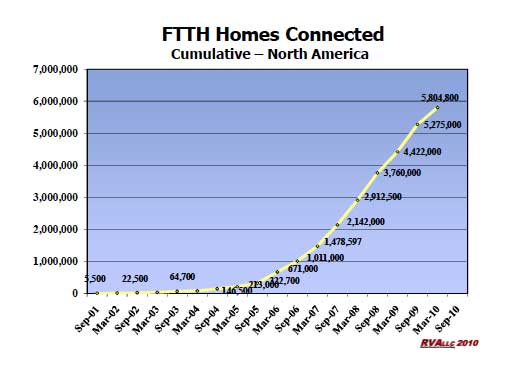 According to a just released FTTH Council Report prepared by RVA, FTTH connections continue to grow in North America - 99% of which are in the US, but growth seems to be slowing, probably a consequence of the current economy. Much of the FTTH deployment in the US has been due to Verizon's $23 billion investment in FTTH, but the report noted that FTTH is now being deployed by more than 750 service providers across North America. Most of these service providers are small, independent telephone companies that are replacing their copper lines with end-to-end fiber to ensure their future competitiveness as broadband providers. Of the service providers not yet offering FTTH, a majority say they are likely to soon. You can download and read the entire report from the FTTH council website. http://www.ftthcouncil.org/sites/default/files/RVA.FTTH_.Apr10.040712Final.pdf New Report : FTTH connections continue to grow in North America You can download and read the entire report from the FTTH council website. http://www.ftthcouncil.org/sites/default/files/RVA.FTTH_.Apr10.040712Final.pdf Fiber-to-the-Home Council to Offer Professional Certification Program to Support Growing Need for FTTH Professionals The Fiber-to-the-Home (FTTH) Council - a trade association of more than 200 companies and organizations dedicated to expanding the deployment of all-fiber, next-generation networks - has announced that it is developing the first-ever certification program aimed specifically at professionals who design, administer, and manage FTTH systems. This complements the FOA CFxT Certification aimed at installers of FTTx programs and should provide a service provider with complete assurance of personnel competence. More. Verizon To Complete FiOS System in 2010, Looks for 40% FiOS penetration This year Verizon Communications (NYSE:VZ) plans to complete the fiber-to-the-premises network it started in 2004, and it is focusing harder on customer penetration. “We’re averaging just under 30% [FiOS penetration] for the whole property,” Verizon CEO Ivan Seidenberg told investors recently. “My people think they can get to 34%. They’re not going to get paid very much if they don’t get to 40%. The question is how quickly we can get there.” (Connected Planet) Consumer Reports Says FTTH Providers Top-Rated FTTH systems, led by Verizon FiOS, get top ratings from users over other Internet connections. (Lightwave) David Chaffee's FTTH Prism Newsletter is Online (archives are at bottom of the linked page)
|
What Is The FOA? Hear FOA President Jim Hayes tell the FOA Story in a 2-part interview by Sound & Video Contractor Contributing Editor Bennett Liles. It tells about the FOA history, goals and achievements. Part 1: http://svconline.com/podcasts/audio/fiber_optic_association_part1/index.html. Part 2 http://svconline.com/podcasts/audio/inside-fiber-optic-association2-0924/index.html. |
|
Digging Safely (Read the FOA Tech Topic) There is a new toll-free "call before you dig" number: 811 See www.call811.com for more information National Fiber Optic Protection Summit: By the "811" group. March, 2008 in Vegas.
|
|
|
New FOA Jobs Website We get many questions from CFOTs, students at FOA-Approved schools and others contemplating getting into the fiber optic business regarding jobs in fiber optics - and how to find them - so we’ve created a new web page to share some information we've gathered about jobs in our industry. The information is designed to help you understand what jobs are available in fiber optics, how to find them and apply for them. While the overall economy is pretty bad - you've probably heard that there are 5 times as many people unemployed in the US as there are jobs available, telecom is a bright spot - broadband is a major focus of stimulus spending in the US and countries around the world are building fiber networks as fast as possible. Even wireless companies have to build fiber for their backhaul. Cities are installing fiber linked surveillance cameras and smart traffic lights. Fiber is the link making Smart Grid possible. Companies like Allied Fiber are building large private networks. Telecom is one of the fastest growing businesses worldwide. If you are looking for a job in fiber optics, here is the FOA's guide to jobs. The FOA has created a group on A list of 10 ways to get your resume noticed from Marketplace on NPR Jobs Created As Part of Stimulus-Funded Projects The federal government is spending 7.2 billion dollars on the Broadband Technology Opportunities Program. This money is working it's way into the economy and hopefully will provide jobs. You can track recovery dollars and look for job opportunities on this website: www.recovery.gov Go to "opportinities" link then "jobs". You will see a section “find recovery jobs” – enter “fiber optic jobs California” or wherever you are and review what comes up. Manager System Test Verification: Reporting to the VP of Engineering - 8/2010 http://executive-advantage.com/Zhone_MSTV The ideal Manager, Systems Test Verification candidate must possess +8 years of complex hands on telecommunications Data/IP systems industry experience within the telecommunications capital equipment industry to include +5 years direct system test engineering management experience. This individual must possess a working knowledge of TDM networks and practical experience in deploying triple play services (data, video, voice) and includes how to troubleshoot fiber related issues as well as how to use tools for testing data, voice, and video services in a lab environment. As an engineer possessing strong engineering skills, this individual must be a domain expert in GPON with associated expertise in OMCI technologies and SNMP PON Management protocols. This individual is currently in a Systems Test Verification like role within the telecommunications Data/IP carrier access capital equipment industry. Also open to candidates possessing large Tier-1 Telco Provider Lab Trial experience. Michael A. Rothstein Managing Principal Executive Advantage Group Direct: 503-372-9084 mrothstein@executive-advantage.com Executive-Advantage.com Fiber/Communications Field Technician (7/2010) Fast paced communications cabling company in Glendale needs an individual with experience in the field of fiber optics installation and testing. Candidates must have experience in working with OTDR's and Fluke DTX testers and must know fusion splicing. Need good communication, leadership and customer service skills. Please call our human resources department at 818-241-6009 x 219 or email resumes to hr@pinnacleinc.com Pinnacle Networking Services SALES REPRESENTATIVE OPENING AT DIAMOND USA (7-10) SUMMARY: Promotes and sells Diamond USA products within New England & NY to all markets as outlined in the corporate marketing plan. ESSENTIAL DUTIES AND RESPONSIBILITIES include the following. Other duties may be assigned. Compiles lists of prospective customers for use as sales leads, based on contacts given from Diamond USA sales office, information from newspapers, business directories, industry ads, trade shows, Internet Web sites, and other sources. Travels throughout New England & NY to call on regular and prospective customers to solicit orders, or talks with customers on sales floor or by phone. Maintains personal contact with key customers in assigned markets. Displays or demonstrates product, using samples or catalog, and emphasizes features and benefits. Quotes prices and credit terms and prepares sales contracts for orders obtained in conjunction with inside sales representatives and/or New Business Development Manager. Communicates date of delivery to customer, based on information given by inside sales representatives. Develops and maintains relationships with purchasing contacts. Investigates and resolves customer problems with deliveries. Attends trade shows as assigned. Participates in sales meetings as requested, offering information on trends in historical product sales. Recommends pricing strategies and promotional programs for key customers in assigned territory. Assists in developing sales plans and strategies for review and approval. May be required to host visiting customers at Diamond USA facility or Diamond SA. Frequently communicates with New Business Development Manager to discuss business activity and reports expected sales trends that may influence buying patterns. Prepares reports of business transactions and keeps expense accounts. Works with inside sales representatives to keep account activities and literature up to date. Reviews and enters new customer data and other sales data for current customers into computer database. Handles any other duties so prescribed by the New Business Development Manager. QUALIFICATIONS: To perform this job successfully, an individual must be able to perform each essential duty satisfactorily. The requirements listed below are representative of the knowledge, skill, and/or ability required. Reasonable accommodations may be made to enable individuals with disabilities to perform the essential functions. EDUCATION and/or EXPERIENCE: College degree or equivalent experience. Minimum of 5 years technical sales experience, preferably with fiber optics products or a related field. OTHER REQUIREMENTS: Valid state motor vehicle operator's license. Willingness to travel extensively in assigned territory. Strong communication skills-verbal, presentation, and writing. LANGUAGE SKILLS: Ability to read and interpret documents such as safety rules, operating and maintenance instructions, and procedure manuals. Ability to write routine reports and correspondence. Ability to speak effectively before groups of customers or employees of organization. MATHEMATICAL SKILLS: Ability to calculate figures and amounts such as discounts, interest, commissions, proportions, percentages, area, circumference, and volume. Ability to apply concepts of basic algebra and geometry. REASONING ABILITY: Ability to apply common sense understanding to carry out instructions furnished in written, oral, or diagram form. Ability to deal with problems involving several concrete variables in standardized situations. FAX OR EMAIL RESUME TO: Steve Bullis Manager of Sales and Technical Support Fax: 978-256-3362 sbullis@diausa.com Engineering/Project Manager-Fiber Optics (7-10) Linden Photonics is a small company that develops technologies related to the fiber optic markets. Specializing in fiber optics and using novel extrusion/molding techniques for thermoplastics, Linden focuses on military and other harsh environment markets. They are currently searching for a full time employee to fill an important position in this growing small business. The ideal candidate will have a strong background in engineering and project management. This position will be largely responsible for handling the management and execution of a 2+ year contract to develop a specialty product. Job duties will include product development, managing a network of subcontractors, and successful commercialization of the finished product. Additional job duties will include growing the commercial side of the business and may include some technical sales and a small amount of travel. 5 to 10 years experience in manufacturing and a BS in an engineering or equivalent technical degree is desired. Knowledge/experience of fiber optics is essential. Experience with distribution and/or disposables/consumables fiber optic market is a plus. Must display entrepreneurial qualities and have a proven record of analytically solving specific engineering problems. For more information on Linden Photonics, check out on the web at www.LindenPhotonics.com Please send resumes to Stephen O’Riorden, Director of Business Development at so@lindenphotonics.com Technical Sales Position (6-10) EigenLight Corporation, a manufacturer of fiber optic test equipment and electro-optical components, is seeking both an experienced and enthusiastic sales person, and an electrical/photonics engineer for our location in the Seacoast region of New Hampshire. Establish and maintain customer relationships. Correspond with customers and field basic questions regarding product line. Enter and process sales orders and quotes. Plan and facilitate customer site visits, trade show exhibits, and advertising collateral. Competitive compensation and benefits. Basic Qualifications Bachelor’s degree and sales experience are required. Must have excellent communication, presentation, and PC skills. Experience with technical sales is a plus. Electrical/Photonics Engineer Job Description Work on the design, development, and manufacturing of novel fiber optic devices for telecommunications applications. Trouble-shoot existing and prototype products to achieve world-class performance and quality. Provide technical support for sales and marketing, with occasional travel to trade shows and customer facilities. Competitive compensation and benefits. Basic Qualifications Bachelor’s degree in Electrical Engineering with 2+ years experience in digital and analog circuit design. Experience with fiber optics and/or photonics engineering a plus but not required. Good written and verbal communication skills Team player with ability to adapt in a dynamic work environment Familiarity with quality systems in a manufacturing environment a plus Please send Resume & Cover Letter to mep@eigenlight.com or fax to (603)692-9205 Test Engineer (5/10) EM4 is seeking a Test Engineer to join our team to support production and to work on new and existing projects and programs. The Test Engineer will both hardware and software test support for optoelectronic, fiber optic, RF and electronic assemblies. Job Description Design and develop test methods, processes, software and hardware for optoelectronic packages, modules and subassemblies, automating wherever possible Identify, design and develop interfaces, fixtures, tooling and equipment required for the testing of optoelectronic packages, modules and subassemblies Working with Purchasing, specify and procure necessary materials, circuit boards, fixtures, tools, equipment and outside services to create test solutions for the company’s products Assemble, integrate and commission test hardware, software, fixtures and equipment Conduct necessary qualification of test hardware and software using industry standard methods and protocols Document software and hardware designs, interfaces, processes and procedures Transfer designs, processes and procedures to manufacturing as required Create work instructions, train Production personnel as required in the use of test hardware, test software, processes and procedures Other duties as assigned Skills RequiredExcellent knowledge of optoelectronic and fiber optic testing methods, equipment and software Excellent test software, hardware, troubleshooting and analysis skills of optoelectronic and electro-optic assemblies Excellent working knowledge of C++, LabView, MathCad, MS Office, HPIB, IEEE Excellent working knowledge of HP, Agilent, ILX, Fluke and similar HPIB/IEEE controlled equipment Experience in SolidWorks a plus Ability to work independently and creatively, improvising as necessary Good knowledge of fiber optics and related areas Working knowledge of necessary optics and electronics Good knowledge of hybrid microelectronic manufacturing equipment Education and Experience>5 years relevant work experience At least BSEE or equivalent Citizenship: US Citizen or Green Card Holder Send resume and cover letter to <pmolenaar@em4inc.com> Inside Sales Application Engineer (4/10) The Inside Sales Application Engineer will have some experience of technically supporting customers in the Defense, Telecommunication, Industrial and Medical markets. The ideal candidate will have a minimum of 5+ years of relevant industry experience, extensive industry knowledge and an established contact base. We would consider less experience with the right candidate. The position is located at EM4’s headquarters in Bedford, MA. EM4, Inc., and its wholly owned subsidiary EM4 Defense, designs, develops and manufactures state-of-the-art, optoelectronic components for the Defense, Broadband and Industrial markets. We offer both Commercial-Off-the-Shelf (COTS) optoelectronic modules, subsystems and unique Optoelectronic Design and Manufacturing Services (ODMS). We are ITAR registered and US-based. Key Responsibilities Seek new opportunities promoting new technical concepts, applications and/or new product and services. Conduct general inquiries with potential customers to keep abreast of new developments and technology in the Defense and Industrial markets. Support in-coming calls for technical and application questions by interacting with engineering group. Write and maintain application notes for all products. Work with the Quality and Engineering groups regarding testing, written reports and communication of results to customers for RMA (Returned Material Authorized) devices. Work with Customer Support to provide quotes, follow-up of quotes and closing of sales. Represent the sales group in weekly meetings regarding production schedules, forecasting, quality control and custom projects. Work with IT to keep data sheets and other information updated on the company web page. Key Qualifications Bachelor’s degree in engineering, business administration or related field plus a minimum of 5+ years related sales and/or engineering experience within the industry. Ability to communicate in an appropriate manner with contacts at all levels of individuals within the Company and Customers. Good organizational, time management and attention to detail skills. Motivated team player with a positive attitude who can work independently. Contact: Edward McCartin Sales Director EM4 Inc. 7 Oak Park Drive Bedford, MA 01730 781-275-7501 x 283 508-525-9534-Cell emccartin@em4inc.com Do listings in the FOA Newsletter Work? Here's feedback: "We did great! We have over 15 interviews next week." Thanks, David Swales, Jr.
|
|
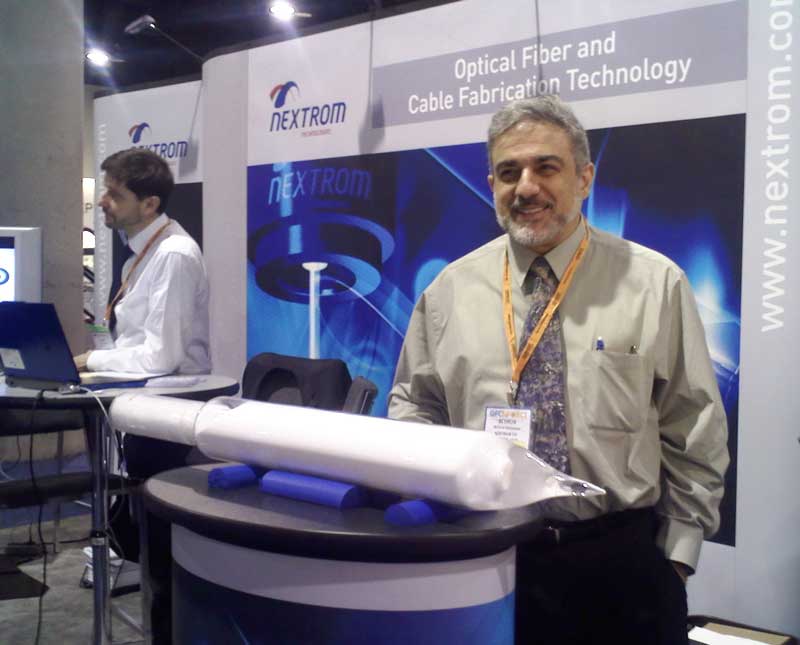
Your Name, CFOT - It pays to advertise! The FOA encourages CFOTs to use the logo on their business cards, letterhead, truck or van, etc. and provides logo files on this site for that purpose. But we are also asked about how to use the CFOT or CFOS certifications. Easy, you can refer to yourself as "Your Name, CFOT" or "Your Name, CFOS/T" for example. Feel free to use the logo and designations to promote your achievements and professionalism! |
|
Remember To Renew Your Certification ! Remember
to renew your FOA certification. All current CFOTs have a ID Card with
their certification data and we keep a database of current CFOTs to
answer inquiries regarding your qualifications if needed. You must be a
current FOA member and CFOT to participate in our online
database of installers, contractors, technicians and consultants.
If you forgot to renew, use the online application
form to renew NOW! You can now renew your FOA certification online - and get an extra month free. Details here. |
|
|
See http://www.thefoa.org/tech/fibr-mfg.htm for more information on fiber manufacturing. See the FOA Reference Guide for more info. (C)1999-20010, The Fiber Optic Association, Inc. |